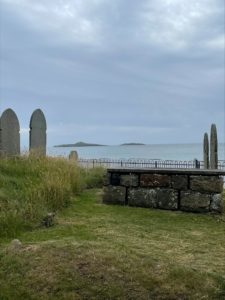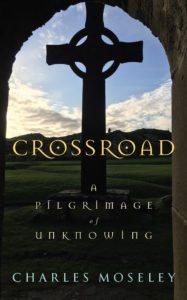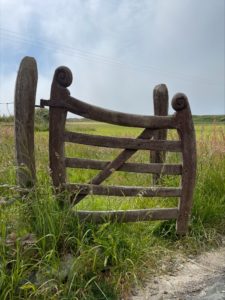Charles Moseley is a Cambridge scholar, teacher and English writer. I took this book with me to the Llŷn Peninsula in North Wales last weekend while present at a conference exploring the poetry of RS Thomas. This book was a perfect accompaniment in my lodgings in Aberdaron. As I looked out over to Bardsey Island – from the Church where Thomas was the parish priest I reflected on the island of 20,000 saints and the focus and destination of many pilgrimages.
The quality of this writing was itself a spiritual experience – a travel journey describing so much – attentive as it was to the landscapes and their stories and history; the spirit and personal meanings of place. Islands and shrines, and rivers and hills are all mapped with sensitive attentiveness. The author is open and curious. He is ready to be surprised and changed by the world around him.

Bardsey Island from Aberdaron
The unique element of this beautifully written prose is its gentle interrogation of self, memory, place and perspective. Moseley invites his reader into wondering what it is that there is wisdom and how we might find truth in place and encounter.
‘What is the human story omits the information? What is it that intrigues us – pushes us on and into further and deeper apprehension of truth and discovery?’ Asks the opening chapter. As we are invited into wondering what it is we want to know and how we achieve both the knowing and the knowledge. There is no easy answer offered – this personal narrative of discovery is complex, contradictory and multi-layered. Throughout each of the eight chapters we are invited into some questions of truth and our own human identity. The reader is challenged to think about what it might mean for us to make a difference in the places and communities we work and live. Moseley doesn’t overload his reader with the expectation of knowledge and information – indeed he tells us that we are to be careful about what we expect from such a journey.
‘Pilgrimage’ ( page 71),’ may be the only journey where you want to get rid of what you carry’. In this sense, the pages of this book are a deep meditation on the present moment and what it is that the now can bring to us and be there for us. There may be something new to delight in. We may have to look inwards and accept our gilts, self-doubts and even failures through the range of wary and anxiety that all of us carry. Anyone walking out might wonder what the future will bring to them and be confronted with both the understandable need to control that the awareness very little is in our ultimate control.’
Just be grateful – is the writer’s plea for us.
On his journey, there are plenty of ordinary human encounters. These take place on the road, in pubs and shops, in conversation with fellow walkers and pilgrims. The quality of attention and sensitivity to detail and the way in which those details are crafted holds a spiritual generativity which is a welcome and rare gift.
All of us need to slow up, breathe deeply and look both inwards and outwards. On a pilgrimage to Walsingham , Mosley writes about loving ourselves as God loves us.
” Perhaps what we beat ourselves up about, things done and not done, and the things we grieve over, how inattentive and un-persevering we are, are not what really matters. They are forgiven anyway, by the very fact of our acknowledging them in sorrow before God. Perhaps there is something deeper in ourselves, we cannot see, but someone can. That rich young man whom Jesus loved: he was a good man, who had kept the commandments all his life, but knew there was something else to be sought. And Jesus asked of him what he could not do. Did he love what he was, himself? And is that what we have to give up in order to have it given back? Like in love? Easy to write about: damnably hard to do. ” (page 121).
There is a rather self-effacing quality to these reflections. The unpredictability of the weather, the slow pace of the walker, the body’s rhythms and breathing changes all contribute to a sense of living in a bigger world and a more plentiful place. It isn’t self obsessed or self preoccupied as it provides a base upon which to reach out and use time differently for others, and for oneself.
There is edge and radical thinking too. Drawing on the work of Josef Pieper (Liesure: the Basis of Culture) we are invited into the argument that our bourgeois and commercial world of total labour has abolished real leisure. We are invited to read again the art of silence and insight and our ability for non-activity. Religion, we are told, can only be born in leisure because it allows time for contemplation of nature and of God. On this walk, we are asked what economic or political models we are entrapped within as a manifesto is opened up for new discovery and new learning.
It won’t surprise you to discover that this is one of my best books of 2022 so far. Take it, read it, allow it to shape and reshape the map of your life – I promise you – you will not be disappointed. Gratitude to Charles Moseley for his skill and life and sense of adventure.

